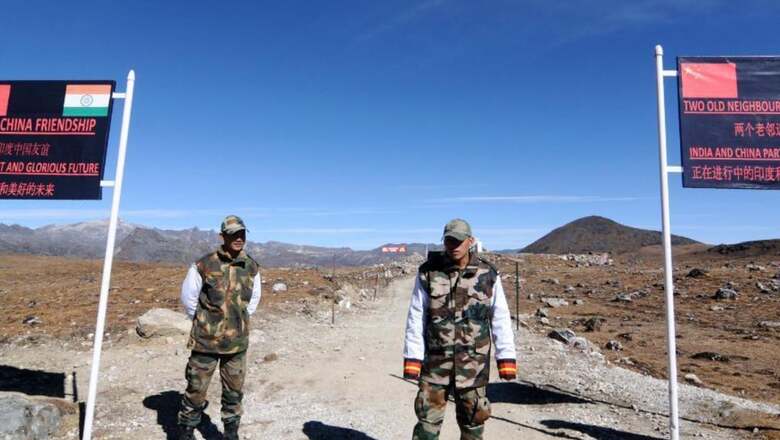
views
China is at its old, dark ways again. Otherwise, there’s no reason why three Indian Wushu sportspersons from Arunachal Pradesh — Nyeman Wangsu, Onilu Tega and Mepung Lamgu — were issued stapled visas. India’s Wushu team was supposed to head for Chengdu to participate in the World University Games beginning Friday. The stapled visas issue is symptomatic of China’s war games and its claim on Arunachal Pradesh that’s integral to Bharat.
The latest fracas seems to be scripted and directed by none other than the Chinese Oligarchs’ frontman and President, Xi Jinping, who’s into his third term as head of the Chinese Communist Party (CCP) and also head of a powerful military commission. The most significant Chinese claim on Arunachal Pradesh, indirectly through stapled visas, comes on a day when three key developments were reported.
Dichotomy in Chinese military checkers came to the fore on the day when Prime Minister Narendra Modi and Chinese President Xi Jinping spoke on the phone to bring about stability on the borders. In fact, this was the first recorded conversation between the two leaders after their brief in-person informal interaction in Bali last year, as part of the G20 group at the invitation of the Indonesian President.
After the Galwan Valley Chinese misadventure, there has been no engagement between heads of state and Jinping was busy ensuring the third Presidential term for himself apart from ‘cleansing’ the party from his political rivals and policy antagonists.
‘Stapled visas’ hogged headlines also on a day when reports poured in about the two leaders’ discussion on a military standoff during April-May 2020 in Eastern Ladakh.
What has induced the ‘stapled visa’ issue larger significance is the reports of the People’s Liberation Army (PLA) heightened build-up from Eastern Ladakh to Arunachal Pradesh borders during the last few weeks.
Nineteen rounds of Corps Commander-level talks between the Indian and Chinese sides have not yielded results nor have led to sensitizing PLA Generals or belligerent Communist leadership in China that rules its own people with an iron fist.
The sense that one gets is China’s outright refusal to disengage from the strategic Depsang Plains and Charding Ninglung Nullah (CNN) track junction at the Demchok in Eastern Ladakh. On the other hand, reports suggest a continued build-up of bunkers, posts, artillery positions, surface-to-air missile systems, radar sites and ammunition storage. Development of new helipads, roads, dual-use villages development and last-mile connectivity has also been on the rise across the border leading to beliefs that negotiations at the political level may ‘not yield’ on-the-ground results but discussions have to happen.
Stapled visas incident is seen more as one step further in China’s grand expansionist plan and communist vision to occupy others’ land disregarding international treaties, pacts and ‘gentlemen’ agreements to not change on-the-ground goalposts.
The only way to put an end to this psycho-warfare is to firmly retake ‘Aksai Chin’. Most of it is in the occupation of China, which captured the region during the 1950s and consolidated its military grip over the area during the 1962 India-China war. China’s claim on Aksai Chin was made a couple of years after the Indian Constitution was adopted in 1950 that included the whole of Jammu and Kashmir along with Ladakh. Aksai Chin was part of Ladakh till the Chinese claim leading to its occupation in the 50s. In fact, no Chinese map till the 1920s even showed Aksai Chin as part of China. And a Sinkiang (Xinjiang) map of the 1930s showed the Kunlun (the mountains) rather than the Karakoram (range) to have been the customary boundary.
Chinese posturing and war games that were shaped by the ‘wolf warrior’ diplomacy doctrine are essentially unsustainable in any bilateral relations. Beijing will have to realise that false claims, wolf warrior diplomacy combined with on-ground, air and water-bound aggression may not help in positioning itself as a leader.
In fact, Qin Gang, who’s been the closest aide to Xi and was later anointed a state councillor was considered the architect of the wolf warrior diplomacy doctrine adopted by the Chinese Communist Party as one of its key principles in engaging with the world. While there’s no trace of ‘missing’ Qin Gang, bringing Wang Yi back as top Chinese diplomat and foreign minister may not help clear the air.
Openness, flexibility and clarity of thought and attitude make great world powers. China has a long way to go, leaving its shady past, false claims and drudgery that the communist regime is known for.
Author is Director and Chief Executive, Centre for Integrated and Holistic Studies, non-partisan think tank based in New Delhi. Views expressed in the above piece are personal and solely that of the author. They do not necessarily reflect News18’s views.
















Comments
0 comment